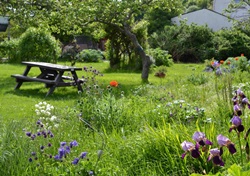![]()
I’ve written a few posts sharing how mentally healing I’ve found spending time in gardens and soaking up everything nature has to offer. I was therefore pleased to discover that this weekend, Sonairte in Co Meath, Ireland’s National Centre of Ecology, would be hosting a training session for anyone interested in learning more about providing Social and Therapeutic Horticulture (STH) for people with mental health support needs.

Tranquil gardens at Sonaitre
For the past few years I’ve worked with adults with intellectual disabilities offering a form of horticultural therapy and last week I finished a course with a branch of the Irish Wheelchair Association helping adults to grow food in recycled containers. Amongst others, I’m working with long-term unemployed, older people living alone and rurally isolated adults in community gardens around Carlow and Kilkenny.
I know I’m not alone in Ireland providing a horticulture service to a diverse range of people who might suffer with mental health issues from mild anxiety to depression, to more profound forms of mental health problems, yet unlike our UK neighbours there’s very little support available to us in this recognised and measurable from of therapy.
I sincerely hope that will change as the excellent training the group of occupational therapists and horticulture practitioners received this weekend, opened our eyes to the tangible mental health benefits that simply being or working in a garden can bring. The knowledge we’ve gained will begin to help us offer and better understand the practical elements of putting together a programme centred around people and not purely the needs of the garden. Damien Newman of Thrive, a UK charity that “champions the benefits of gardening, carrying out research, training professionals and offering practical solutions so that anyone with a disability can enjoy gardening”, delivered an excellent course that’s given us a lot to think about.

Horticulture therapy for mental health isn’t a new phenomena. *In ancient Egypt royal physicians prescribed “a spell in the palace gardens for those troubled of mind” and in 1856 Dorset County Asylum wrote that “male patients shall be employed in gardening and husbandry… to promote cheerfulness and happiness.”
Having completed the second stage of learning, our group now have a year to decide whether we individually wish to take on an eight week distance course via Thrive and Coventry University in an undergraduate module leading us to an Award in STH, a project I’m planning to begin during the quieter time of my gardening year.

If you’re interested in learning more about Social and Horticulture Therapy in Ireland, contact Veronica Macfarlane of Sonairte for more information on future courses or check out Thrive in the UK directly who run a range of course options as well as gardens to visit, a library full of information that can support social and horticultural therapy students and practitioners, as well as professionals on hand to offer advice and information in general.
Have you noticed how spending a couple of hours outdoors can improve your mood and feelings of general well-being?

Dee Sewell – a horticulturalist and certified trainer who started Greenside Up in 2009 and teaches people how to grow vegetables. Dee specialises in working with community gardens but also offers workshops, allotment visits, consultations, horticultural therapy, afterschools clubs as well as local talks – she tailors her services to meet clients needs. In 2012 Dee launched a Seed Gift Collection containing varieties of vegetable and insect friendly flowers with the aim of getting more people growing. Dee’s blog was a finalist in the 2012 Ireland Blog Awards in the Eco/Green and Lifestyle Categories.
Source: GreensideUp – Supporting Mental Health Needs with Horticulture – Dee Sewell




